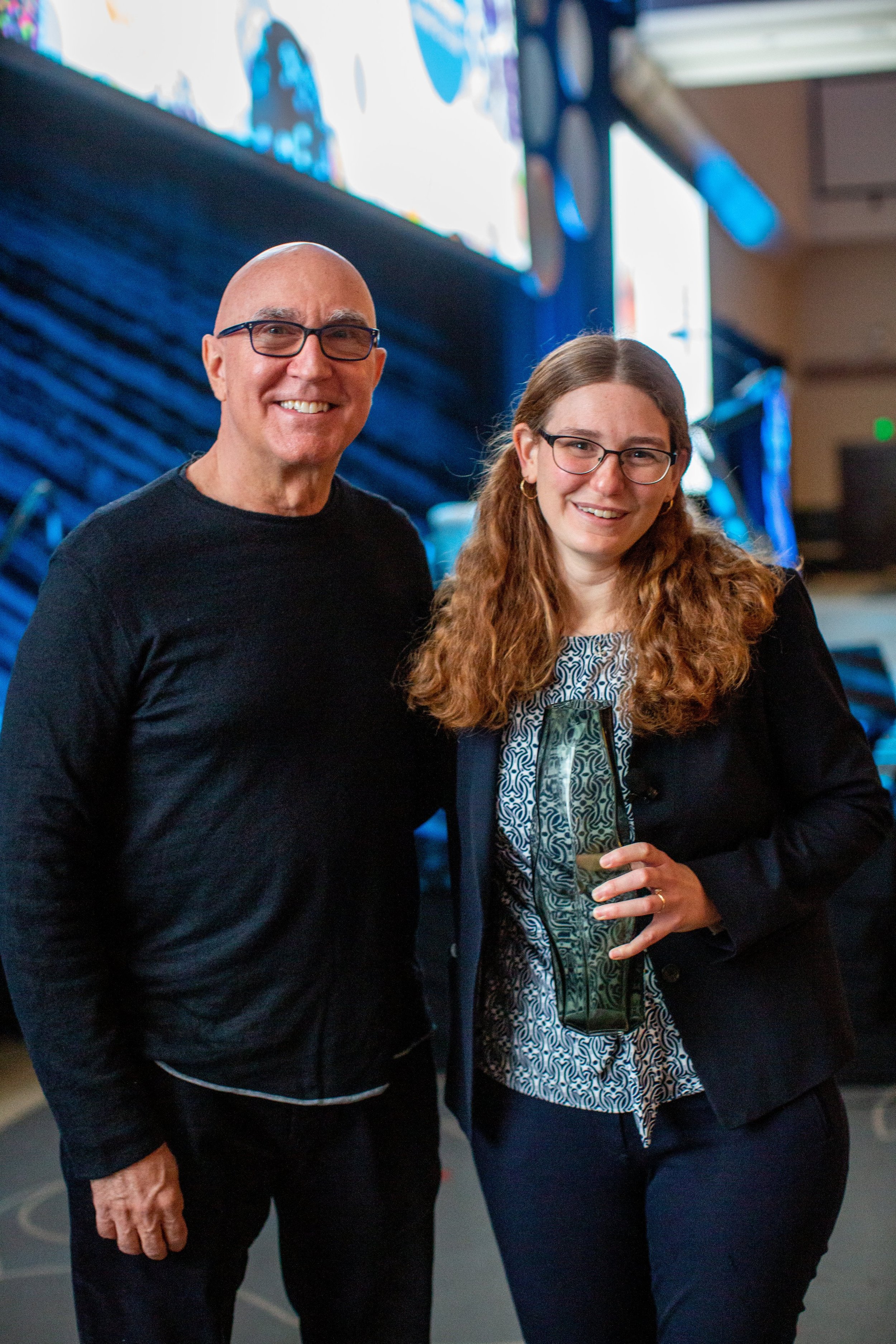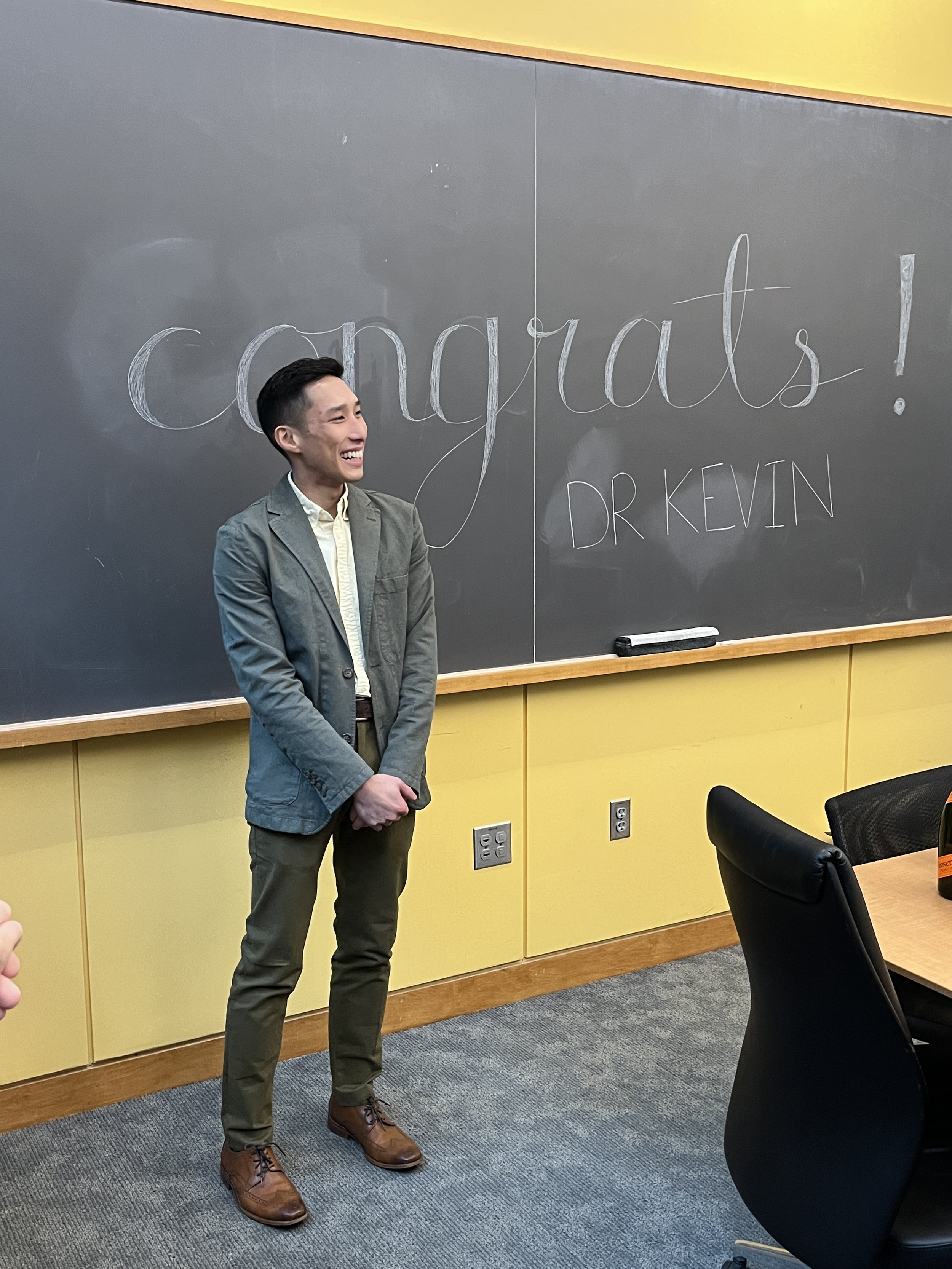It’s been a wild year with lots of ups and downs, including many beloved labmates leaving. Notably, we had four new Liau Lab Ph.D.s this year! All four of these talented students were among the first students in the lab, and so we wanted to make a special post commemorating their graduations. Stay tuned for another end-of-year blog post documenting our other festivities as well as scientific accomplishments :)
Congrats to Ally, Kevin, Allison, and Amanda!
First up is Ally Freedy, our resident M.D.-Ph.D. who defended in May. Ally was a key player in our lab’s projects studying LSD1 and PRC2 (look out for the latter story coming to a journal near you soon…). In particular, she helped pioneer CRISPR-suppressor scanning, and later in her Ph.D. focused on PRC2 biochemistry, helping to establish protocols for insect cell recombinant protein expression in our lab. Outside of lab, she was extensively involved in Harvard Women in Chemistry, serving as President. She delivered a spectacular defense and is now finishing her M.D. at Harvard Medical School.
Congratulations to Dr. Freedy!
Ally recently received the 2022 Broad Award in Scientific Excellence!
Next up is Kevin Ngan, who defended in October. Kevin has been instrumental in our lab since day 1, serving as an expert in cell culture, NGS, and computational analysis. Many of our lab’s protocols (including pivotal screening- and sequencing-related ones) were in fact written by him (look out for our CRISPR-suppressor scanning protocols paper soon…). Kevin’s contributions have ranged far and wide within our lab, but he has especially been focused on applying CRISPR screening to study molecular glue mechanism of action (see his and Pallavi’s ACS Central Science paper) and mechanisms of allostery in the DNA maintenance methyltransferase DNMT1 (preprint is available on bioRxiv, paper coming out soon!). Beyond his scientific accomplishments, Kevin has been a huge source of support and mentorship to many in the lab and has had an unmeasurable impact on our lab’s culture. He is also an avid rock climbing enthusiast who has gotten most of the lab into the sport. Having finished his Ph.D., Kevin is now working as a scientist at a biotechnology company, Tessera Therapeutics.
Congratulations to Dr. Ngan!
November brought us Allison Siegenfeld’s defense. Allison is our resident computational biology expert and DNA gel enthusiast. From chemical synthesis to large-scale genomics to even fluorescence microscopy, Allison has done it all. She initiated our lab’s research in 3D genomics and, together with Shelby, developed a pioneering approach to look at how DNA is positioned in 3D space within the nucleus, how it contacts other DNA, and the patterns by which it is marked by DNA methylation, all in one simultaneous experiment (check out their Nature Communications paper). She has also served as a computational expert in our lab’s efforts to study LSD1 and PRC2, proving her bioinformatic chops. More than this, she is an enthusiastic mentor, selfless source of advice and support, and a beacon of positive energy. Beyond our lab, Allison has also been highly engaged in the broader CCB community, in particular through her work with the Harvard Women in Chemistry, where she started a mentorship program. In the new year, she will be starting as a Postdoc in Prof. Karen Adelman’s lab at Harvard Medical School, so keep an eye out for her future scientific work!
Congratulations to Dr. Siegenfeld!
Finally, in December we witnessed a truly inspiring defense courtesy of Amanda Waterbury. In Brian’s words, Amanda is “a chemical biologist in the truest sense of the word.” Her graduate work has been exceptionally interdisciplinary, encompassing chemical synthesis, protein biochemistry, mass spectrometry, cell biology, fluorescence microscopy, genetic screening, and more, and she has quickly developed mastery in all of these areas. In particular, she has focused on studying the mechanisms of action of LSD1 inhibitors, ranging from an active site-targeting inhibitor that blocks TF interaction to a puzzling compound that chemically modifies the LSD1 active site. Keep an eye out for her upcoming work in these areas, which should be published in the near future. Beyond this scientific work, Amanda has been a mentor to many and the lab’s authority on all things protein-related (and cat-related). She has selflessly worked to keep the lab running and is the exemplary lab citizen. Her true scientific passion is in chromatin biochemistry, and she will be continuing this work as a Postdoc in Prof. Phil Cole’s lab at Harvard Medical School! Though luckily for us, we still have a bit more time to enjoy her company and expertise before she leaves.
Congratulations to Dr. Waterbury!
These departures are especially bittersweet, as Kevin, Allison, and Amanda are the last of our lab’s first cohort of graduate students. These three helped found the lab and shape everything that we do, and for that we are so thankful. As Brian said, “you never forget your first students.” So, we end this blog post with some photos of Brian with his first mentees.
Congratulations to all!








